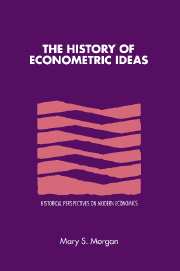Book contents
7 - Errors-in-variables and errors-in-equations models
Published online by Cambridge University Press: 26 October 2009
Summary
The evolution of formal models of the data-theory relationship is complex and intertwined with other important issues in theoretical econometrics such as identification, simultaneity and causality. The tale of how these models developed is recounted through a series of letters which I imagine to have been written by econometricians of the period 1900 to 1950. These letters provide both a synthesis of the history of the ideas involved and a rather personal internal account. The imaginary authors of these letters (named with Greek letters) represent the composite views of a number of econometricians; none consistently represents the views of any single writer. Following Lakatos (1976), the actual history (authors, dates and sources) is told in the notes following each letter. These notes are brief, for most of the literature and ideas involved either have already been discussed in the context of the applied work or will be discussed in detail in the final chapter. Although some letters bear a close resemblance to articles cited in the footnotes, others elucidate less explicit views. The growing formality of the model representations in the letters, and the increasingly technical nature of the discussions, also reflect the real literature.
The chapter is divided into two major parts and a substantive postscript.
- Type
- Chapter
- Information
- The History of Econometric Ideas , pp. 194 - 228Publisher: Cambridge University PressPrint publication year: 1990



